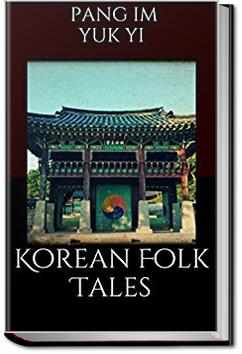UNLIMITED Audiobooks and eBooks
Over 40,000 books & works on all major devices
Get ALL YOU CAN for FREE for 30 days!
Korean Folk Tales
Pang Im
Book Overview:
To any one who would like to look somewhat into the inner soul of the Oriental, and see the peculiar spiritual existences among which he lives, the following stories will serve as true interpreters, born as they are of the three great religions of the Far East, Taoism, Buddhism and Confucianism." Manuscripts by two of Korea's (possibly) most famous authors, dating from the seventeenth and early eighteenth centuries were uncovered in the early years of the twentieth century. Translation revealed stories that are not for the faint-hearted: gruesome, harsh, unlovely, depicting scenes of the day, as well as the hope for better things.
To any one who would like to look somewhat into the inner soul of the Oriental, and see the peculiar spiritual existences among which he lives, the following stories will serve as true interpreters, born as they are of the three great religions of the Far East, Taoism, Buddhism and Confucianism." Manuscripts by two of Korea's (possibly) most famous authors, dating from the seventeenth and early eighteenth centuries were uncovered in the early years of the twentieth century. Translation revealed stories that are not for the faint-hearted: gruesome, harsh, unlovely, depicting scenes of the day, as well as the hope for better things.
How does All You Can Books work?
All You Can Books gives you UNLIMITED access to over 40,000 Audiobooks, eBooks, and Foreign Language courses. Download as many audiobooks, ebooks, language audio courses, and language e-workbooks as you want during the FREE trial and it's all yours to keep even if you cancel during the FREE trial. The service works on any major device including computers, smartphones, music players, e-readers, and tablets. You can try the service for FREE for 30 days then it's just $19.99 per month after that. So for the price everyone else charges for just 1 book, we offer you UNLIMITED audio books, e-books and language courses to download and enjoy as you please. No restrictions.
The desire of all Taoists is “eternal life,” chang-saing pul-sa; that of the Buddhists, to rid oneself of fleshly being. In the Taoist world of the genii, there are three great divisions: the upper genii, who live with God; the midway genii, who have to do with the world of angels and spirits; and the lower genii, who rule in sacred places on the earth, among the hills, just as we find in the story of Chang To-ryong.]
In the days of King Chung-jong (A.D. 1507–1526) there lived a beggar in Seoul, whose face was extremely ugly and always dirty. He was forty years of age or so, but still wore his hair down his back like an unmarried boy. He carried [31]a bag over his shoulder, and went about the streets begging. During the day he went from one part of the city to the other, visiting each section, and when. . . Read More
Try now for FREE!

"Love your service - thanks so much for what you do!"
- Customer Cathryn Mazer
"I did not realize that you would have so many audio books I would enjoy"
- Customer Sharon Morrison
"For all my fellow Audio Book & E-Book regulars:
This is about as close to nirvana as I have found!"
- Twitter post from @bobbyekat



Community Reviews
2.5
4 stars
Many stories in this book might be considered lacking in length or depth.
Most of them do not take more than a few pages, the plot when it is there, is mostly glossed over. As a reader you don't get to learn much about the characters, sometimes they don't even get names. However one might arg
Zápisky za hranicí uvěřitelného je drobná knížečka přinášející většinou velmi krátké příběhy ze staré Koreje, kterou si užijí maximálně hardcore fanoušci různých mýtů a legend či lidových vyprávění, nebo zapálení fanoušci Koreje. Pokud nejste ani jedno, Zápisky vám toho nemají moc co nabídnout.
Příb
İlk hikayeyi çok beğensem de diğer hikayeler bana çok kısa ve anlamsız geldi. İyi davranışların karşılığı olarak "doğaüstü" bir varlık tarafından zenginlik ve sağlık bahşedilmesi olayının çok sık tekrar ettiğini fark ettim. Kültürel bir öge olduğunu düşündüğümden hoşuma gitti.
The collection of stories contained in this book were interesting, but I can't say that I would have enjoyed reading them if I had never studied Korean history, Korean language or lived amongst Korean people in Korea. For the average reader without context I think the stories might be a little borin
يعرفنا هذا الكتاب على ادب القصة الكورية، حكايات شعبية يتناقلها الاجداد للأحفاد، مازال الكوريون يتناقلون هذه القصص الى اليوم.
18 قصة قصيرة في الكتاب، عن معاني اراد الكاتبين ايصالها، معاني النبل
والاحترام والصدق والأمانه والكثير منها.
الكتاب مصحوب بفهارس توضح للقارئ جانب من ثقافة المجتمع الكوري.
Un libro de historias coreanas del siglo XVI y XVII
Lo mas sorprendente es que los autores creen estas historias completamente.
En una historia un zorro se convierte en persona y el autor se pregunta cuales seran los mecanismos de tal conversion, pero nunca se plantea que quiza no ocurrio.
Tambien es s
This was OK. I'm sure much of that is due to the translation; there was a lot that would clearly mean something to someone who understood Korean history and culture, but was not explained at all for non-Korean audiences. Still, there were some interesting stories.
On the other hand, this was publishe